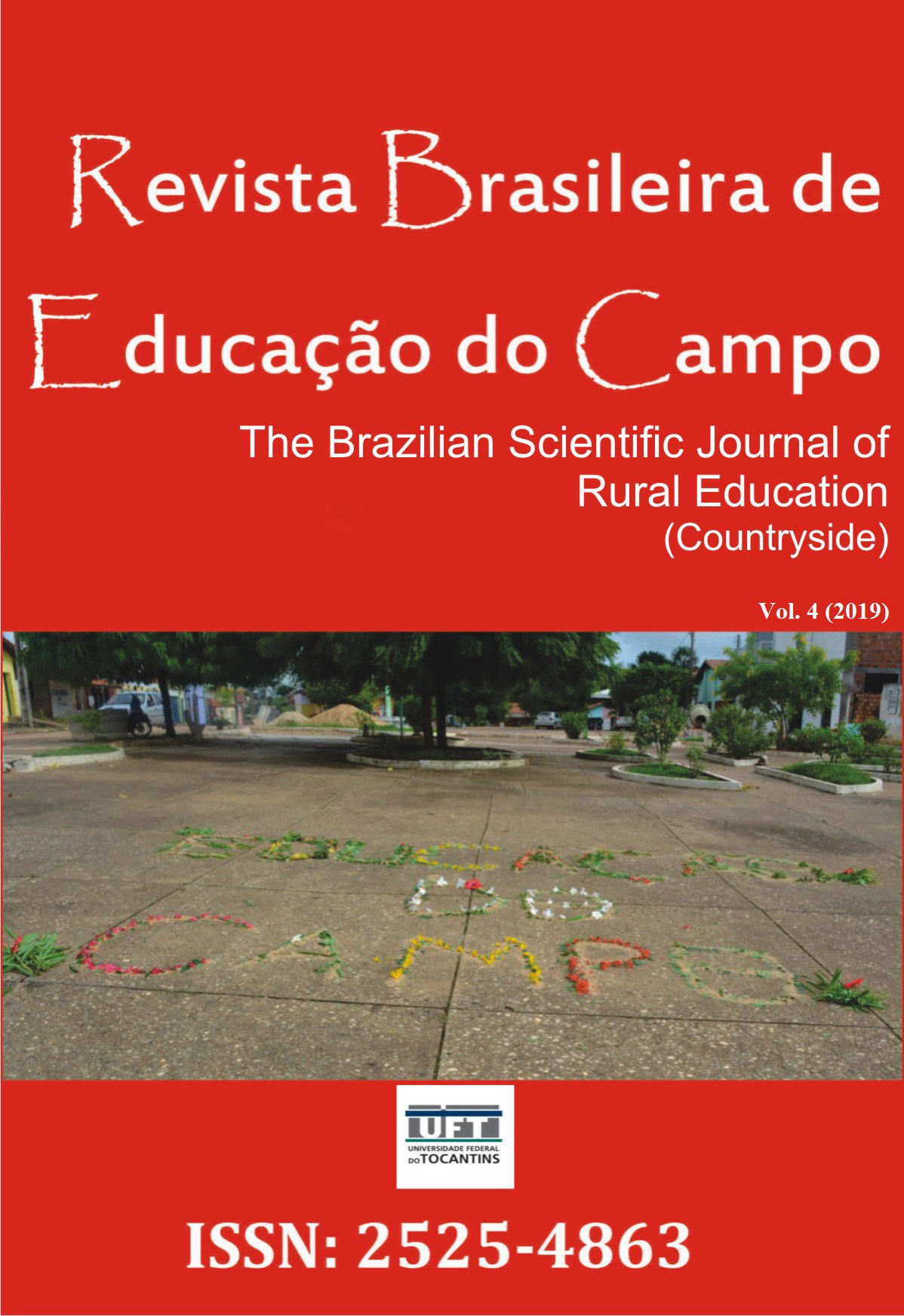The contribution of the Alternation Pedagogy and the young professional project in the life projects of young graduates of the EFA in Jaguaré/ES
DOI:
https://doi.org/10.20873/uft.rbec.e7245Abstract
In this article, we seek verify the contribution of the alternation pedagogy in the projects of working life of the students that concluded the Technical course in Farming in the Agricultural Family School of Jaguaré. We exposed part of a research developed through a temporal clipping between the years of 2011 and 2016, where we investigated the young graduates of the EFA (abbreviation for Agricultural Family School in Portuguese) in that interval, upon their free and voluntary participation as subjects of this analysis. The objective was to investigate the reality of these young people where we specifically sought to understand if they put in practice the Young Professional Project (final work of the Technical Course in Farming) in their properties seeking professional autonomy; verify the permanence or not in the countryside, as well as the continuity of the same ones in the studies. The results showed that the young people put the projects into practice, continued their studies and remained in the countryside, maintaining themselves economically through agricultural activities with their families and other young people. In this context, we noticed that the Alternation Pedagogy has stood out in the development of the integral formation of rural young people, who have experienced this pedagogy. The conclusion points out challenges and propositions regarding the possibilities of advancement in the countryside of projects in family agriculture.
Downloads
References
Abramovay, R. (1992). Paradigmas do capitalismo agrário em questão. São Paulo: HUCITEC.
Abramovay, R. (1999). Agricultura familiar e desenvolvimento territorial. Reforma Agrária, Rio Claro (SP), vol. 28, nº1, 2 e 3, vol. 29, nº1, p. 49-67, jan.1998/ago.
Ferreira, B. (2010). Coordenadora de Desenvolvimento Rural da Diretoria de Estudos e Políticas Sociais (DISOC) do IPEA.
Caliari, R. O., Alencar, E., & Amâncio, R. (2002). Pedagogia da Alternância e desenvolvimento local. Organizações Rurais e Agroindustriais, 4, 6-8.
Carneiro, M. J. (1998). Ideal urbano: campo e cidade no horizonte dos jovens. In Silva, F. C. T. et al. (Orgs.) Mundo rural e política: ensaios interdisciplinares (pp. 98-100). Rio de Janeiro: Campus.
Castro, E. G. (2008). Os jovens estão indo embora? Relações de hierarquia e disputa nas construções da categoria juventude rural. In Costa, S., Sangme, H., & Steckbauer, S. (Orgs.). O Brasil na América Latina: interações, percepções, interdependências (pp. 161-167). São Paulo: Annablume.
Castro, E. G. et al. (2009). Os jovens estão indo embora?: Juventude rural e a construção de um ator político. Rio de janeiro: EDUR/Mauad.
Castro, E. G. (2010). Juventude rural “mais que uma palavra” – uma problematização da construção de categorias sociais. In Moreira, J. R., & Bruno, R. (Org.). Interpretações, estudos rurais e política (pp. 61-94). Rio de Janeiro: Edur/Mauad.
Cunha, M. A. A. (2011). Expectativas de jovens camponeses na universidade: os desafios de uma formação em nível superior. Interação, 36(1), 263-283.
Flitner, A. (1968). Os problemas sociológicos nas primeiras pesquisas sobre juventude. In Britto, S. (Org.). Sociologia da Juventude I (pp. 37-68). Rio de Janeiro: Zahar.
Gandin, D. (1997). O planejamento como prática educativa. São Paulo: Loyola.
Instituto Brasileiro de Geografia e Estatística (IBGE). Censo 2010. Rio de Janeiro: IBGE. Recuperado de http://www.censo2010.ibge.gov.br
Jesus, J. G. (2011). Formação de professores na pedagogia da alternância- Vitória, ES: GM.
Menezes, R. R. (2013). As escolas comunitárias rurais no município de Jaguaré: um estudo sobre a expansão da pedagogia da alternância no estado do Espírito Santo (Dissertação de Mestrado). Universidade Federal do Espírito Santo, Vitória.
Nosella, P. (2007). As Origens da Pedagogia da Alternância (Dissertação de Mestrado). Pontifícia Universidade de São Paulo em 1977 e divulgada para a UNEFAB (União Nacional das Escolas Famílias Agrícolas do Brasil). Brasília, DF, Brasil.
PPP. (2015). Projeto Político Pedagógico da Escola Família Agrícola de Jaguaré. Jaguaré.
Regional das Associações dos Centros Familiares de Formação em Alternância do Espírito Santo - RACEFFAES. (2014). Cultivando a educação dos povos do campo do Espírito Santo. São Gabriel da Palha/ES.
Stropasolas, V. L. (2011). O mundo rural no horizonte dos jovens. Florianópolis: Editora da UFSC.
Weisheimer, N. (2001). Os jovens agricultores: trabalho e reprodução social na agricultura familiar (Monografia de Graduação). Universidade Federal do Rio Grande do Sul, Porto Alegre.
Published
How to Cite
Issue
Section
License
Proposal for Copyright Notice Creative Commons
1. Policy Proposal to Open Access Journals
Authors who publish with this journal agree to the following terms:
A. Authors retain copyright and grant the journal right of first publication with the work simultaneously licensed under the Creative Commons Attribution License that allows sharing the work with recognition of its initial publication in this journal.
B. Authors are able to take on additional contracts separately, non-exclusive distribution of the version of the paper published in this journal (ex .: publish in institutional repository or as a book), with an acknowledgment of its initial publication in this journal.
C. Authors are permitted and encouraged to post their work online (eg .: in institutional repositories or on their website) at any point before or during the editorial process, as it can lead to productive exchanges, as well as increase the impact and the citation of published work (See the Effect of Open Access).















